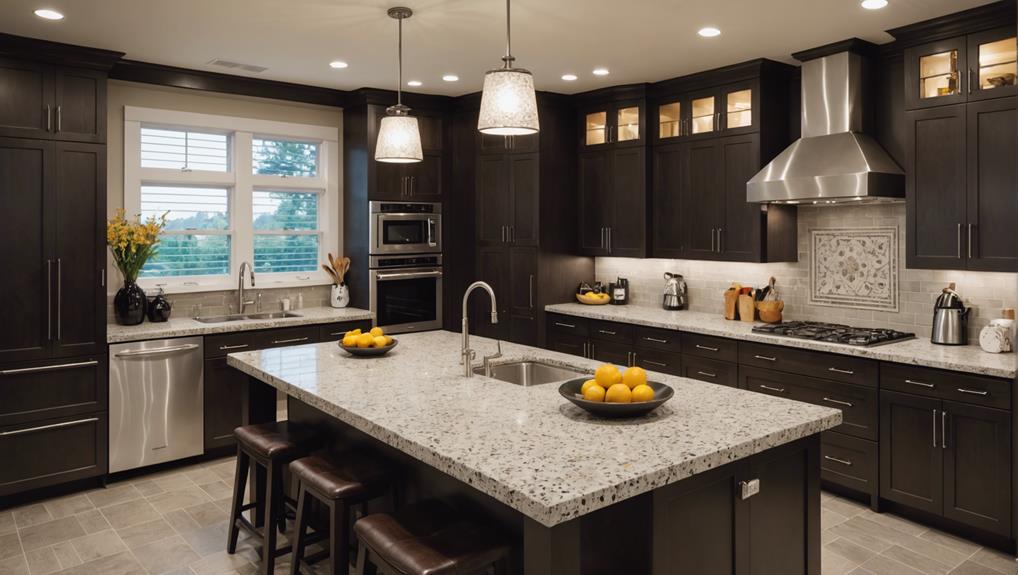
Essential Tips for Choosing Tiled Kitchen Countertops
When selecting tiled kitchen countertops, consider the tile material carefully. Porcelain and ceramic tiles offer durability and easy maintenance, while natural stone like granite enhances elegance but requires regular sealing. Design is important; coordinate colors and textures for a cohesive look and experiment with patterns like herringbone or mosaic accents. Larger tiles reduce grout lines and simplify cleaning, whereas smaller mosaics provide a classic feel but need more upkeep. Prioritize stain-resistant grout to maintain aesthetic integrity. Expert installation guarantees longevity and peak performance. Explore further to discover how best to balance aesthetics with functional needs.
Key Takeaways
- Select porcelain tiles for high durability, low maintenance, and water resistance, ideal for busy kitchens.
- Opt for larger format tiles to reduce grout lines and simplify cleaning.
- Choose stain-resistant and non-absorbent grout to enhance countertop longevity.
- Consider natural stone tiles like granite for elegance, but be prepared for regular sealing and maintenance.
- Harmonize tile color and patterns with countertops and flooring for a cohesive kitchen design.
Consider Tile Material
When selecting kitchen countertop tiles, it is important to evaluate the material options, as each type—ceramic, porcelain, natural stone, and glass—offers distinct advantages and maintenance requirements.
Ceramic tiles, known for their versatility and affordability, come in a wide array of color options, allowing homeowners to customize their kitchen aesthetics with ease. They are also durable but should be sealed to prevent staining and water damage.
Porcelain tiles stand out for their exceptional durability and low porosity, making them ideal for high-traffic kitchens. Their water-resistant nature simplifies cleaning, reducing maintenance considerations significantly. Available in numerous colors and finishes, porcelain tiles can mimic natural stone or wood, catering to various design preferences.
Natural stone tiles, including granite and marble, exude elegance and timeless appeal. However, they necessitate regular sealing to preserve their quality and prevent stains. Their unique color options and natural patterns provide a luxurious touch but require diligent upkeep.
Glass tiles offer a sleek, modern look and are non-porous, ensuring easy cleaning. Despite their susceptibility to scratches, they present vibrant color options that can enhance the kitchen's visual appeal.
Each material demands careful consideration to balance aesthetics and maintenance needs efficiently.
Evaluate Design Options
Delving into the myriad design options for tiled kitchen countertops allows homeowners to transform their kitchens into personalized spaces that reflect both functionality and style. The selection process begins by considering the extensive range of materials available, including ceramic, porcelain, natural stone, and glass. Each material brings its unique aesthetic appeal and practical benefits, making it crucial to choose one that aligns with your kitchen's overall theme.
Colour coordination plays a pivotal role in achieving a cohesive look. Opt for hues that complement your kitchen's existing palette, or introduce contrasting elements to create a striking visual impact. For those who wish to explore beyond standard designs, creative layout experimentation offers a plethora of possibilities. Herringbone patterns, diagonal arrangements, and border tiles can dramatically alter the visual dynamics of your countertop.
Mosaic accents are another excellent way to infuse character and artistry into your kitchen space. These intricate designs can serve as focal points or seamlessly blend with the overall layout for subtle elegance.
Additionally, harmonizing your tiled countertop design with the backsplash and flooring ensures a well-coordinated and sophisticated look. By thoughtfully combining patterns, textures, and finishes, homeowners can craft a kitchen countertop that is both practical and visually stunning.
Focus on Tile Size
Selecting the appropriate tile size for your kitchen countertop is a critical decision that influences both the aesthetic appeal and practical functionality of the space. Larger format tiles have gained popularity in contemporary kitchen designs due to their sleek, modern look and reduced grout lines. This translates into easier maintenance, as fewer grout lines mean less space for dirt and food particles to accumulate. The visual impact of large tiles can make a kitchen appear more spacious and streamlined, which is particularly advantageous in smaller kitchens.
Conversely, smaller mosaic tiles create a more intricate and traditional appearance but come with increased grout lines. The need for additional grout makes the countertop more susceptible to trapping debris and stains, necessitating more diligent upkeep. Material selection plays a significant role in this dynamic; some tile materials may be more forgiving when it comes to maintenance than others, regardless of size.
Ultimately, the choice of tile size should be guided by your priorities—whether that's minimizing maintenance, achieving a specific aesthetic, or balancing both. A careful consideration of grout size and its impact on both maintenance and visual appeal will lead to a well-informed decision, enhancing the overall functionality and beauty of your kitchen countertop.
Assess Grout and Maintenance
Considering the influence of tile size on both aesthetics and practicality, it's critical to thoroughly assess the grout and maintenance requirements that come with your chosen design. Grout cleanliness is a crucial factor, especially in the kitchen where countertops are subjected to daily use.
Larger format tiles are currently trending due to their sleek appearance and practical benefits, particularly the reduction in grout lines. Fewer grout joints translate to a more streamlined look and less surface area requiring maintenance, thereby simplifying long term upkeep.
Conversely, mosaic tiles, while visually appealing with their intricate patterns, present a significant challenge regarding maintenance. The increased number of grout lines necessitates more diligent cleaning efforts to prevent staining and water damage. Uneven grout joints can exacerbate this issue by trapping food particles, making grout cleanliness a persistent concern.
To mitigate these challenges, consider using stain-resistant and non-absorbent grout. Such materials enhance the durability and longevity of your tiled countertops by resisting stains and moisture absorption. Regular maintenance, including resealing grout joints, is essential to preserve the countertop's aesthetic appeal and functional integrity over time.
This proactive approach ensures that your kitchen remains both beautiful and practical for years to come.
Plan for Durability
Maintaining the durability of your kitchen countertops starts with selecting materials that can withstand the rigors of daily use and preserve their aesthetic appeal over time. Porcelain and ceramic tiles are top choices due to their exceptional impact resistance and longevity. Porcelain tiles, known for their hardness and water-resistance, are particularly well-suited for high-traffic kitchen areas, providing a robust surface that endures frequent activities without showing wear.
Ceramic tiles also offer commendable wear-resistance and lightfastness, making them a practical option for those seeking long-lasting countertops. However, for those who prefer a touch of elegance, natural stone tiles such as granite can be an excellent choice. While these tiles require regular sealing to maintain their surface protection, they bring a timeless and sophisticated look to any kitchen.
For a sleek, modern aesthetic, glass tiles are another option, though they may be more prone to chipping and may require additional care.
Regardless of the material chosen, using appropriate sealants is essential for enhancing surface protection and extending the life of your countertops. By carefully selecting materials and employing effective maintenance practices, you preserve both the durability and beauty of your kitchen countertops for years to come.
Set a Budget
Setting a clear budget for your tiled kitchen countertop is essential to managing material costs, installation expenses, and ongoing maintenance.
By evaluating these factors, you can make informed decisions that balance aesthetic appeal with financial feasibility.
Consulting with professionals will provide accurate estimates, ensuring your project stays within budget while meeting your design aspirations.
Estimate Material Costs
Creating a thorough budget for tiled kitchen countertops necessitates a detailed assessment of both tile quantity and associated materials like adhesive, grout, and sealant. Begin by measuring the countertop area to determine the exact material quantity required. This initial step in budget planning is important, as it directly influences the overall project cost.
Research a variety of tile materials to identify options that align with your financial constraints while meeting aesthetic desires.
Conducting cost comparisons among different suppliers is another essential strategy. By obtaining quotes from multiple sources, you can negotiate better prices, ensuring you stay within your budget. Supplier negotiation can lead to significant savings, especially if you're purchasing in bulk.
Additionally, factor in the costs of adhesive, grout, and sealant—often overlooked, these materials are essential for a durable and visually appealing installation.
Understanding the market trends in tile prices can further guide your budget decisions. For instance, porcelain and ceramic tiles may offer a cost-effective solution without compromising on style. By meticulously planning and comparing costs, you can achieve a beautiful, functional kitchen countertop that aligns with both your aesthetic preferences and budgetary constraints.
Factor Installation Expenses
A thorough budget for installing tiled kitchen countertops should encompass not only the cost of materials but also labor, tools, and potential additional services required during the installation process. When setting a budget, it is crucial to take into account your installation timeline and explore both DIY options and professional installation. Each approach has its own set of cost implications and potential savings.
For those with a keen eye on cost saving tips, opting for a DIY installation can greatly reduce labor costs. However, this requires a certain level of skill and access to specialized tools.
Conversely, professional installation may come with a higher upfront cost but ensures a timely and flawless finish, potentially saving on future repairs or adjustments.
Budgeting also involves accounting for unforeseen expenses or potential upgrades that might arise. Hidden issues such as subfloor damage or the need for additional materials can impact the overall cost. Including a buffer within your budget can provide financial flexibility, allowing for a smoother installation process.
Incorporating these considerations aids in better financial management and ensures that the installation of your tiled kitchen countertops aligns with both your aesthetic expectations and budgetary constraints.
Plan for Maintenance
Establishing a maintenance budget for tiled kitchen countertops is essential to account for regular sealing, grout cleaning, and potential repairs, safeguarding their longevity and pristine condition. Proactively managing these aspects can prevent costly surprises and uphold the aesthetic appeal of your kitchen.
Firstly, understanding the maintenance frequency is vital. Grout sealing, for instance, should be performed every 1-2 years to prevent staining and water damage. This regular upkeep is indispensable, as neglected grout can lead to more extensive and expensive repairs. Allocating funds specifically for these periodic tasks will guarantee your countertops remain functional and visually appealing.
In addition to sealing, professional grout cleaning services might be necessary to maintain the cleanliness and hygiene of your countertops. These services can effectively address deep-seated grime that typical household cleaning might miss. Budgeting for these professional touch-ups will extend the lifespan of your tiled surfaces.
Moreover, considering the longevity of different tile materials can help in forecasting long-term maintenance costs. Natural stone tiles, for example, may require more frequent sealing and specialized cleaning, translating to higher maintenance expenses compared to ceramic tiles.
Ultimately, having a well-planned maintenance budget safeguards your investment, ensuring your tiled kitchen countertops remain in impeccable condition for years to come.
Seek Professional Advice
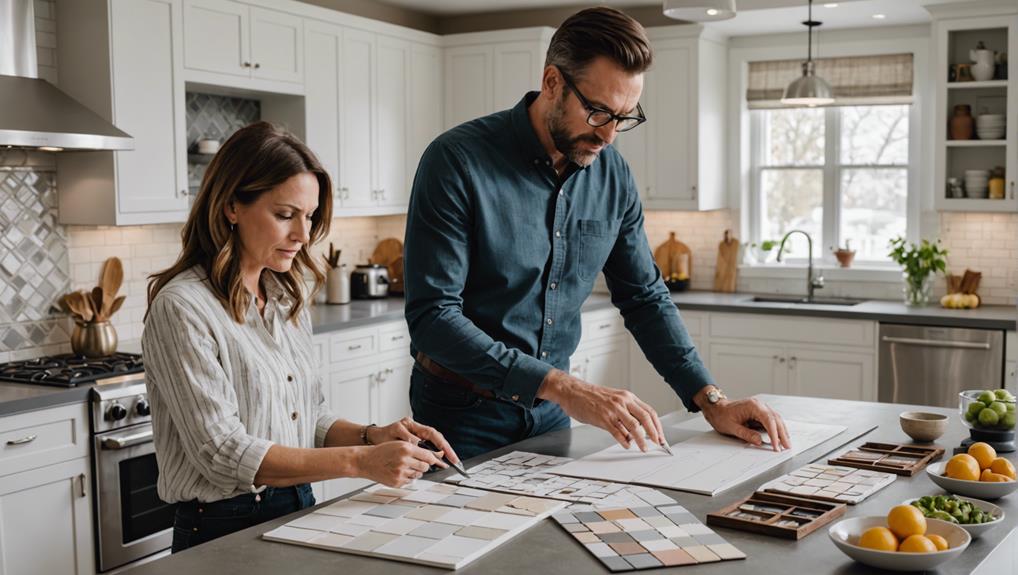
Engaging a professional can streamline your decision-making process by providing expert material recommendations tailored to your kitchen's unique requirements.
Accurate measurement techniques and installation best practices guarantee a flawless fit and finish, enhancing both functionality and visual appeal.
Leveraging professional insights not only optimizes the aesthetic outcome but also secures long-term durability and compliance with safety standards.
Expert Material Recommendations
Consulting with a professional can help you identify the best tile material for your kitchen countertops, balancing durability, maintenance, and aesthetic appeal. Maintenance considerations are vital, as they directly impact the longevity and look of your countertops.
For those seeking a versatile and cost-effective option, experts often recommend ceramic tiles. These tiles are known for their affordability, durability, and low maintenance, while offering a variety of colors to suit any kitchen style.
Durability comparisons are essential when evaluating the suitability of tile materials. Porcelain tiles, for instance, stand out due to their exceptional durability and water resistance. Their low porosity and ability to mimic natural materials make them a popular choice for modern kitchens. Although the initial cost may be higher, the long-term benefits often justify the investment.
Natural stone tiles like granite or marble offer unparalleled aesthetic appeal but come with higher maintenance considerations. Regular sealing is necessary to preserve their beauty and functionality.
For a sleek, contemporary look, glass tiles provide a non-porous surface, though they are susceptible to scratching. A cost analysis can help you weigh these factors effectively, ensuring you select a material that aligns with your budget and design goals.
Accurate Measurement Techniques
Accurate measurement techniques are crucial for guaranteeing a flawless installation of tiled kitchen countertops, and seeking professional advice can significantly enhance this process. Professional guidance in measurement precision is invaluable for preventing costly errors and ensuring that the tiles fit seamlessly. Experts utilize advanced tools and methodologies to confirm exact dimensions, thereby reducing the risk of adjustments or replacements.
Professional services not only guarantee precise measurements but also help determine the exact quantity of tiles needed. This ensures that your project stays within budget and time constraints, while also achieving the desired aesthetic outcome. Leveraging expert insights in measurement precision can transform the installation process into a streamlined, efficient endeavor.
Here's a comparative overview of the benefits of professional guidance versus DIY approaches:
| Aspect | Professional Guidance | DIY Approach |
|---|---|---|
| Measurement Precision | High | Variable |
| Time Efficiency | Optimized | Potentially Lengthy |
| Error Minimization | Significant | Higher Risk of Errors |
| Peace of Mind | Assured | Uncertain |
Installation Best Practices
With precise measurements in hand, seeking professional advice for the installation of tiled kitchen countertops guarantees that proper techniques and materials are employed for a flawless and durable finish. Engaging experts ensures that the base is adequately prepared, preventing common issues such as cracked tiles and difficult-to-maintain grout joints. The selection of the right tiles, tailored to your kitchen's aesthetic and functional needs, is an area where professional insight proves invaluable.
Quality installation is not merely about placing tiles; it involves a meticulous process that encompasses the choice of appropriate adhesives and grouts. Professionals can recommend stain-resistant and easy-to-clean grouts, essential for maintaining the long-term beauty and hygiene of your kitchen countertops. The application of proper techniques ensures that tiles are evenly spaced and securely affixed, enhancing both the durability and the visual appeal of your countertops.
Moreover, expert installation contributes significantly to the longevity of tiled surfaces, protecting your investment and ensuring your kitchen remains stylish and functional for years to come. By prioritizing professional guidance, you align your project with current trends and best practices, achieving an end result that combines aesthetic elegance with robust functionality.
Frequently Asked Questions
What Is the Best Type of Tile for a Kitchen Countertop?
The best type of tile for a kitchen countertop is porcelain tiles due to their superior durability and water resistance. Granite tiles also offer a premium, elegant aesthetic but require regular sealing to maintain their pristine condition.
How Do You Match a Countertop to Tile?
To match a countertop to tile, focus on color coordination and texture harmony. Choose complementary or contrasting colors and coordinate patterns and textures to create a cohesive, visually appealing design that aligns with contemporary kitchen trends.
How to Pick the Right Countertop for Your Kitchen?
To pick the right countertop for your kitchen, balance budget considerations with countertop durability. Evaluate materials based on aesthetic appeal and functionality, ensuring they align with your kitchen's style and layout while staying informed on current design trends.
What Do You Put Under Tile Countertops?
For tile countertops, a stable base of marine grade plywood and tile backer board is crucial. Utilize waterproof membranes to prevent moisture damage and select high-quality adhesive choices to guarantee a durable and aesthetically pleasing finish.
Conclusion
To wrap up, selecting the best tiled kitchen countertop necessitates a thorough evaluation of material, design, tile size, grout, and maintenance considerations. Durability and budget must be meticulously planned to guarantee a practical yet aesthetically pleasing result.
Consulting professional advice enhances decision-making, ensuring alignment with current trends and expert recommendations. By integrating these essential criteria, homeowners can achieve a kitchen countertop that is both functional and visually appealing, reflecting informed and strategic choices.
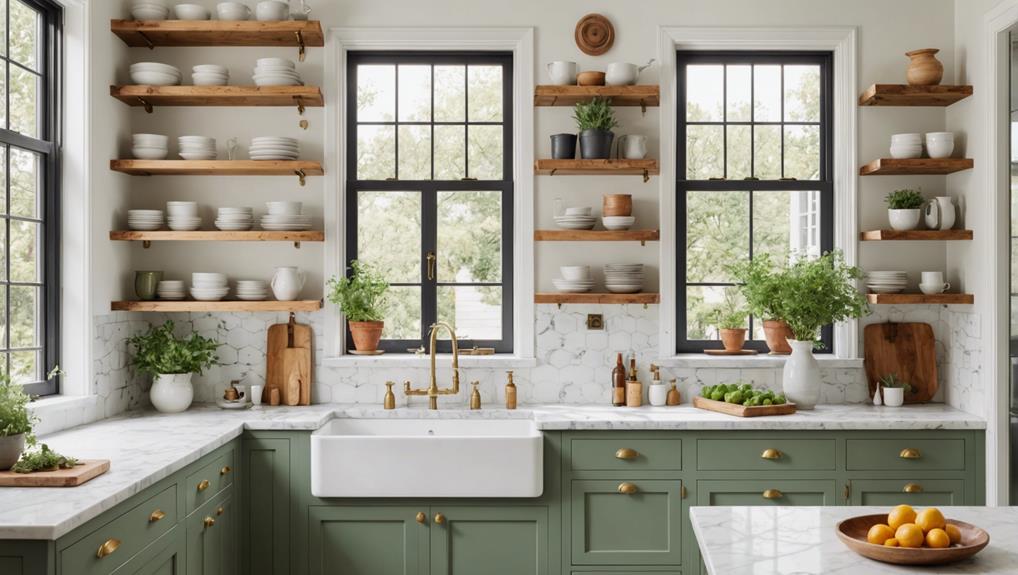
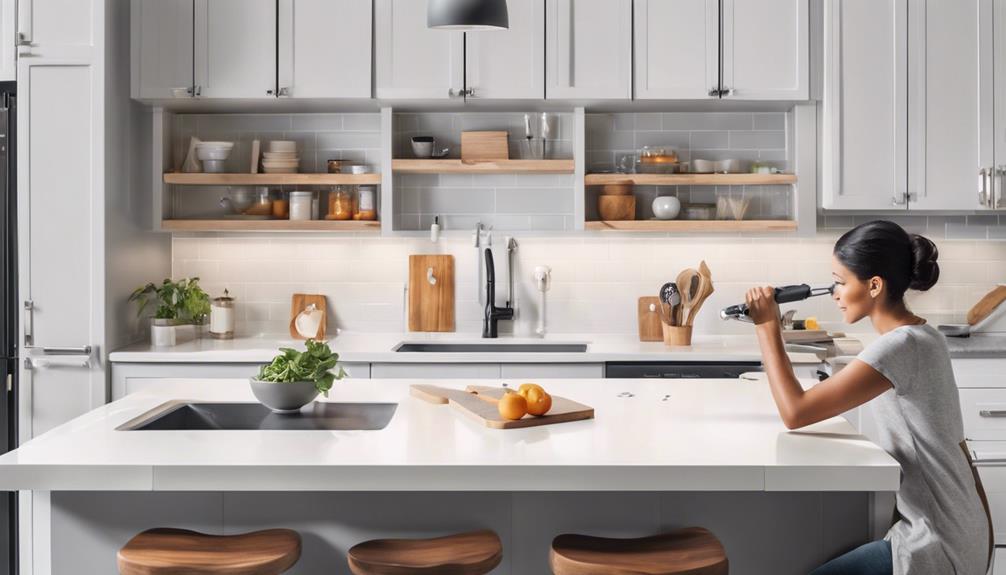
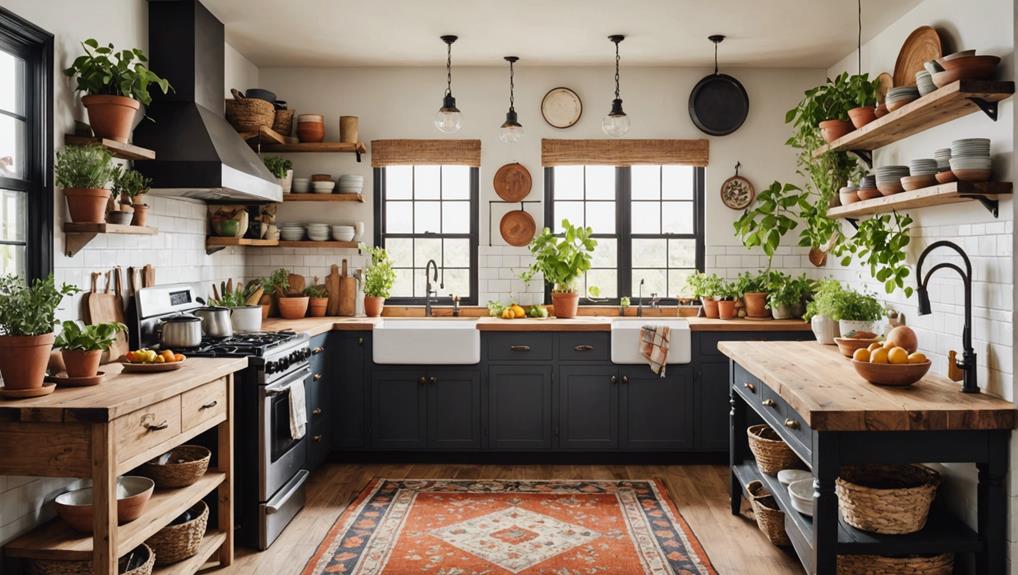
Leave a Reply